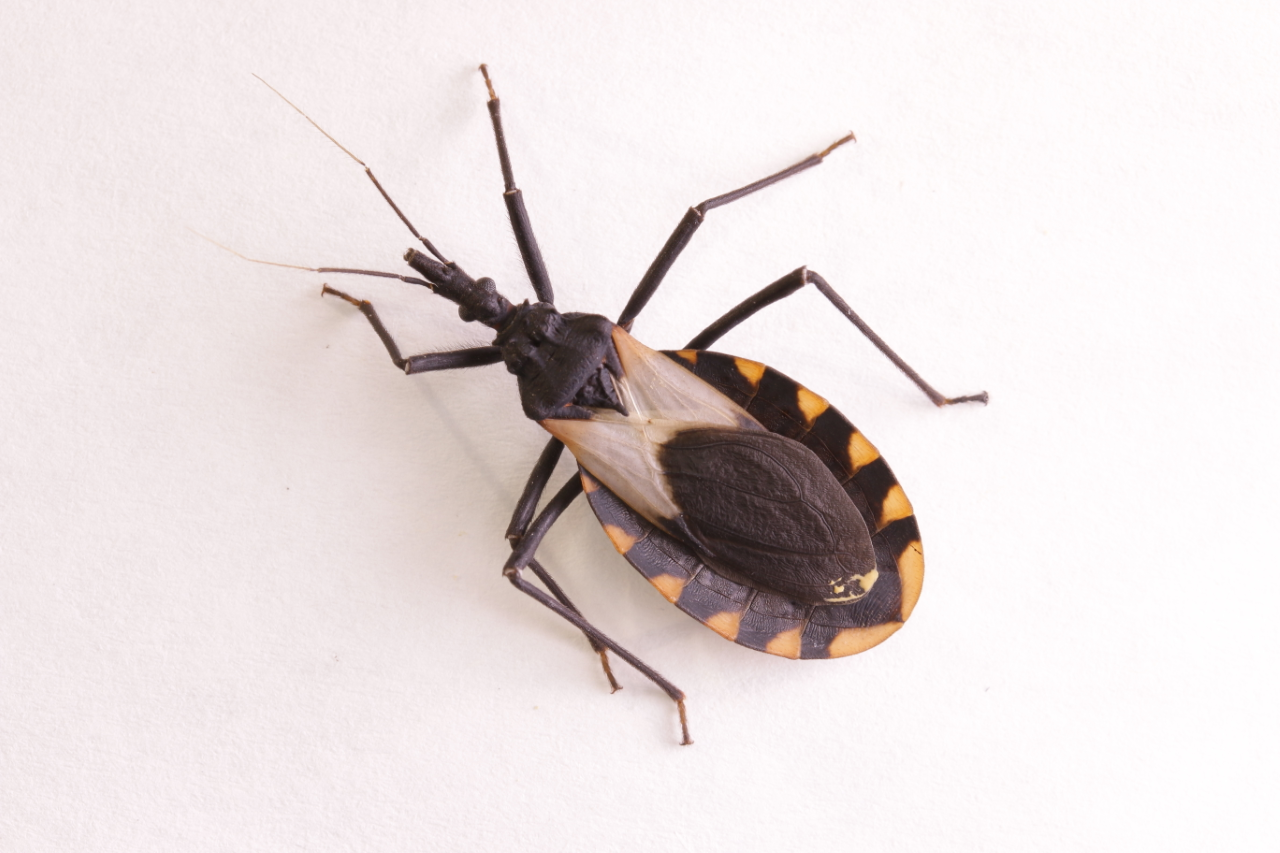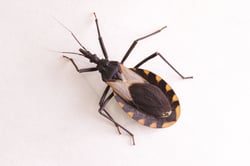With Valentine’s Day just around the corner, we thought it would be fitting to discuss the insects struck by Cupid’s bow: lovebugs and kissing bugs. With names as innocent as this, it can be easy to assume lovebugs and kissing bugs are harmless. Love might be in the air, but it’s time to take off our rose-tinted glasses and learn more about these sweetly named bugs. Are lovebugs and kissing bugs harmful or harmless?

 Kissing bug
Kissing bug
What is a lovebug?
Lovebugs are so much more than just a nickname for your significant other - lovebugs are real insects! Lovebugs are a species of march fly and are common in parts of the southeastern United States, specifically along the Gulf Coast. Black in color with a red spot just behind the head, lovebugs go by a few different names, including honeymoon fly and double-headed bug. All of the lovebug’s names are in reference to their mating habits in which lovebugs can be seen connected for several days at a time, even in flight.
It’s reported that lovebugs first appeared around 1911 and populated just Texas, Florida, Alabama, Mississippi, and Louisiana at that time. Experts estimate that lovebugs likely spread all along the Gulf Coast, including Georgia and South Carolina, around the 20th century. To this day, lovebugs remain abundant in these areas, often appearing as large swarms during peak mating season.
While not particularly harmful to humans directly (they neither bite nor sting), lovebugs are still a source of concern for some. This is because lovebug swarms can become extremely overbearing during mating season. Swarms can become so thick that the vision of drivers can become impaired due to the lack of visibility. These swarms can also leave massive tar-like splatters of lovebug remains on the grill, bumper, and hood of cars. Highly acidic in nature, lovebug splatters can burn the paint and plastics of your car after just 24 hours. They can even clog radiators and lead to overheating engines in some extreme cases. It is not uncommon for people to wash their cars every day in areas heavily affected by lovebug swarms to prevent damage.
Despite mating season being a horror for many car owners, lovebug larvae are actually extremely beneficial to the ecosystem. Feeding on decaying vegetation, lovebug larvae act as natural decomposers by recycling plant matter like dead leaves and grass. They convert this plant matter into what’s known as humus, a rich and deeply nutritious dirt-like matter that improves soil’s health.
.png?width=250&height=167&name=MicrosoftTeams-image%20(34).png) Two lovebugs mating
Two lovebugs mating
What is a kissing bug?
Despite their cute name, this is one bug you do not want a kiss from!
Kissing bugs, also known as assassin bugs, conenose bugs, and vampire bugs, are of the Triatominae subfamily. Aptly named for their eating habits, kissing bugs feed primarily on vertebrate blood, with a few species feeding on invertebrate blood. These blood-suckers tend to live close to their feeding sources, often nesting directly with the animals they’re drinking from. Kissing bugs are widespread in the U.S. and are most easily identified by their black or brown striped bodies, cone-shaped head, and thin legs and antennae.
Kissing bugs have long since adapted to living with humans, a fact that is very problematic for said humans. This is because it’s estimated that roughly 55% of kissing bugs carry a parasite known as Trypanosoma cruzi that causes Chagas disease. Chagas disease can affect humans and animals, including household pets. The parasite can be passed when kissing bugs leave an open wound after feeding, but it is not spread through saliva. Rather, kissing bugs will occasionally defecate while feeding - if this waste makes its way into the open wound, the parasite can then be passed. This means that not every person bitten by a parasite-carrying kissing bug will necessarily contract Chagas disease.
Chagas disease can be a potentially dangerous disease. For some, they may go years without even knowing they have contracted Chagas disease. Others, however, may experience severe swelling, flu-like symptoms, and rashes. In chronic and untreated cases, congestive heart failure can occur.
If you suspect you may have Chagas disease or have recently been bitten by a kissing bug, please contact a medical professional immediately.
How can I prevent lovebugs or kissing bugs?
At EcoShield, we believe prevention is always the best approach to avoiding pest problems. That said, preventing some pests is easier said than done. We have compiled a few tips for preventing both lovebugs and kissing bugs respectively.
Lovebug Prevention
- To keep them out of your home, seal any cracks, crevices, or other openings into your home. Ensure window screens are intact, door sweeps are well-fitted, and all doors and windows remain closed during mating season.
- Lovebugs are attracted to light colors, so avoid wearing these when outdoors.
- Do not paint during mating season as lovebugs are attracted to fresh paint.
- Keep a fresh coat of wax on your car to make swarm clean-up easier and prevent potential damage to your car’s paint.
- Lovebugs are not strong fliers, so sometimes a strong fan can even prevent them from getting too close.
- Lovebug larvae thrive in thick grassy areas, so keeping your lawn well-manicured will discourage lovebugs from hunkering down.
Kissing Bug Prevention
- Seal cracks and gaps around windows, walls, roofs, and doors.
- Remove wood, brush, and rock piles near your house.
- Use screens on doors and windows and repair any holes or tears.
- Make sure yard lights are not close to your house, as lights can attract bugs.
- Seal holes and cracks leading to the attic, crawl spaces below the house, and to the outside.
- Encourage pets to sleep indoors, especially at night.
- Keep your house and any outdoor pet resting areas clean, in addition to periodically checking both areas for the presence of bugs.
What should I do if I have a problem with lovebugs or kissing bugs?
Ultimately, the best guidance we can offer is to call a trusted professional when experiencing problem pests. At EcoShield, we use professional-grade products that are botanically based and safe for both children and pets and are properly applied by our licensed technicians. We have the knowledge and industry-standard best practices to treat your pest problems efficiently. Whether you are dealing with ants, mosquitoes, bed bugs, roaches, stinging insects, mice, lovebugs, or kissing bugs, EcoShield has experts ready to help! Call us today or fill out the form on this page to get your free no-obligation quote.